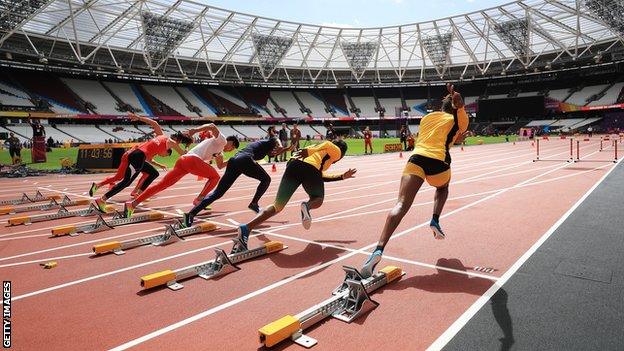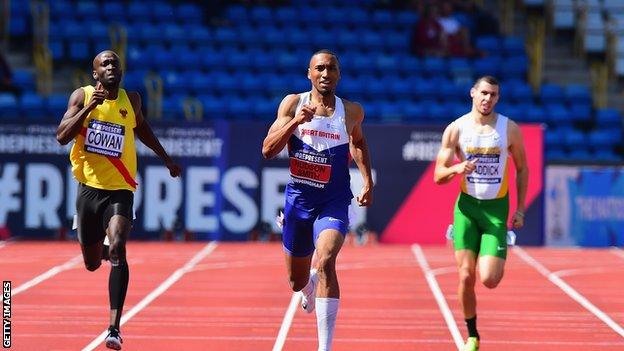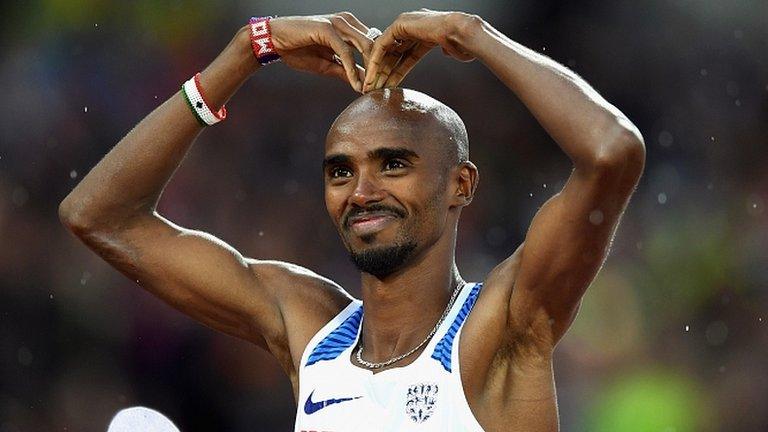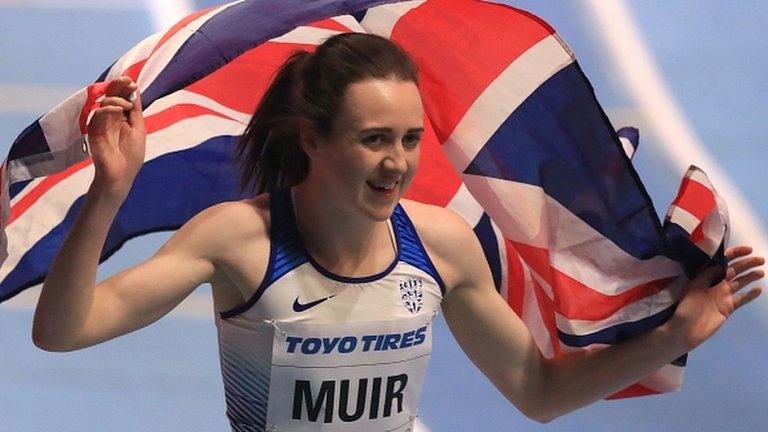World Athletics Championships 2017: London event 'an opportunity that must be seized'
- Published

Preparations are under way at London Stadium for the World Championships, which start on Friday
World Athletics Championships on the BBC |
|---|
Venue: London Stadium Dates: 4-13 August |
Coverage: Live across BBC One and Two, BBC Radio 5 live, BBC Radio 5 live sports extra, the BBC Sport website and app.Click for times |
Walk around London Stadium, as I did earlier this week, with final preparations being made for athletics' World Championships, and it is impossible not to be taken back to that heady summer five years ago, when track and field - the Olympic movement's flagship sport - provided the most iconic moments of an unforgettable Games.
When the action gets under way on Friday and the world's finest athletes go head to head, London 2017 will of course evoke memories of the London 2012 Olympics, which for many back then, seemed like the best of times for the sport.
Without retired Jessica Ennis-Hill, British medal prospects may be a little less certain these days. Big names like David Rudisha, Greg Rutherford and Andre de Grasse are missing through injury.
However, with Jamaican sprint legend Usain Bolt preparing to race for the last time before retirement, and new stars emerging like South African Wayde van Niekerk and Laura Muir of Great Britain, public appetite remains undimmed, with more tickets having been sold than any previous World Championships.
But in other ways, much has changed.
London 2017 could be last of its kind - Warner
London 2017 comes at a pivotal time for the sport and feels like an opportunity that must be seized if track and field is to restore its reputation and relevance. It should also perhaps be savoured while it lasts.
Ed Warner, co-chairman of the event, certainly believes so.
"This could be the last great, great traditional-format championships," he told me.
"London has a great offering. It's a huge city passionate about sport, it's got the world's greatest athletics stadium and it's going to be full. It creates that cocktail of athletes and fans that the sport needs to thrive globally.
"Going forwards you need to see slight changes to the format - a compression of the championships so that it's more accessible in many more cities around the world. This is a traditional championship - 10 days, a lot of competition - and it's going to work because we are going to have a full crowd every time but the sport can't always do that."

Matthew Hudson-Smith won the 400m in front of empty seats in Birmingham, but British Athletics say attendances were up from last year
With athletics facing mounting competition for talent, sponsors and fans from NFL through to to esports, and changing viewing habits in the digital age, IAAF president Lord Coe has said that remaining relevant to the young was his sport's greatest challenge.
Swathes of empty seats at the recent British trials in Birmingham only served to amplify such concerns.
"The biggest threat to athletics and to all traditional sports is esports and you have to rise to that challenge and embrace technology and different ways of presenting sport to be relevant to a new generation," agrees Warner.
"It's even happening with football where we are seeing viewing figures declining as people consume their sports in a different way. The challenge for the IAAF is to structure competition so that it's more bitesize and technology-friendly and does catch the imagination of young people."
But this is about a lot more than new formats.
Consider the great state-sponsored doping scandal that plunged athletics into crisis last year. From the absence of the suspended Russian team to the awarding of medals to athletes following retrospective testing years after they were cheated out of them, the ramifications will be painfully obvious over the next 10 days.
Having established a new, independent Athletics Integrity Unit headed up by respected former World Anti-Doping Agency chief David Howman, and taken a much tougher stance with the Russians than the International Olympic Committee - which controversially allowed the country to compete at the Olympics - the IAAF has tried to restore faith, pledging more intelligent testing, and a cultural shift on the part of athletes, coaches and administrators.
But there will no escaping the past. Not if boos and jeers ring out when one of the 19 Russians allowed special dispensation to compete in London wins an event in neutral kit and the IAAF anthem is played, rather than their own.
Not when the country has found it so hard to say sorry for the staggering findings of the scandal.
Not when Britain's Mo Farah loses patience at being asked another awkward question about his biological passport, or the Usada investigation into his coach Alberto Salazar.
Not when Coe admits he cannot guarantee cheating will be absent from these championships or Bolt warns cheats the sport "could die" if they don't stop.
Not when conversation turns to the European Athletics' recent proposal to wipe all words records set before 2005 from the history books in a bid to reboot the sport.
Usain Bolt tells BBC sports editor Dan Roan that if athletes keep doping, the sport will 'die'
And certainly not when Icarus, the remarkable film exposing how Russia subverted the entire anti-doping system and distorted both the 2012 Olympics and 2014 Winter Games (among many other events), is released globally by Netflix on Friday.
Filmmaker and co-star Bryan Fogel, who set out to make a documentary charting his experiment on the effect performance-enhancing drugs would have on his amateur cycling career but who instead stumbled across the biggest scandal in sports history, told BBC Sport of his fears for athletics.
"It's not like Russia has dominated world sports, certainly it is logical to believe this is not just a Russian problem," he says.
"The question is have other countries facilitated the kind of fraud that Russia facilitated? And to that I don't have the answer. I know of other scandals that [Russian whistleblower] Grigory Rodchenkov has shared with me, of other countries and other instances where some pretty spectacular frauds have happened."
"The only way the anti-doping system in sport is ever going to work is if somehow medical technology, science stops, and nothing else comes forward.
"The problem is that the science is always evolving. So it's always going to be a cat and mouse game. And when you have billions and billions of dollars and pounds, trillions, on the line of what international sports is, how do you truly combat this problem, or this illusion of what we want to believe is clean sports? They're the issues that are facing the anti-doping system."
With doping, it's always going to be 'a cat and mouse game' - Bryan Fogel
Warner is more upbeat, insisting London 2017 can still be a celebration.
"I don't think it will overshadow this event, but it is clearly a cloud that sits above the whole of the sport," he says.
"You can't hide from it and nor should you. The sport has called the cheats out and isn't hiding from that and I celebrate that approach to it.
"For me, when we look back at the end of the championships will we think: 'Russian X wasn't here and Russian Y wasn't here?' I don't think so.
"It's the same with an athlete with an injury. It's a great shame [defending champion] David Rudisha won't be at the championships, but the 800m for me will still be a wonderful event and people will remember what happen on the track.
"So they won't remember the missing Russians and more fool the Russians for what they did and they are paying the punishment.
"If you asked a young child walking out of here on Sunday week whether they have had a joyous time, then I think they will have done - and I think we are going to have 700,000 people coming through here having a joyous time.
"Ultimately it's about great sport and whatever happens in the background we have got to push through that."
As the action gets under way, and athletics enjoys its moment in the sun amid a packed sporting summer, it must hope that London 2017 is not sabotaged in the way we now know London 2012 was.
- Published13 August 2017

- Published3 March 2018
